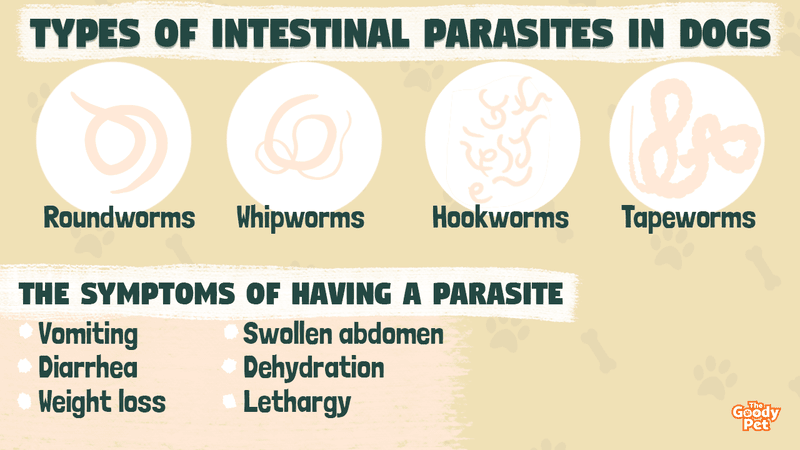Your dog getting infected by intestinal parasites and worms is something no dog owner wants to deal with, but it’s an eventuality every dog owner needs to be prepared for.
What are intestinal parasites? Intestinal parasites are organisms that live in your dog’s intestines and derive their nutrients either from the food your dog eats or from your dog’s blood. Left untreated, parasites will affect your pet’s health, which is why they need to be dealt with immediately.
As a dog owner, you need to be aware of what needs to be done in the event that your doggie gets infected by intestinal parasites. In this article, we will cover all you need to know about intestinal parasites in dogs, including how to tell if your dog is infected, ways through which your dog could get infected, and what to do in case of an infection. To start off, let’s look at common parasites that can infect your dog.
What Is The Most Common Parasite In Dogs?
Here are some of the most common parasitic worms found in dogs that affect the intestines:
Roundworms
Roundworms are the most common intestinal parasites that affect dogs. Roundworms are long and whitish, like spaghetti. Dogs can get infected by two types of roundworms – Toxocara canis and Toxascaris leonina.
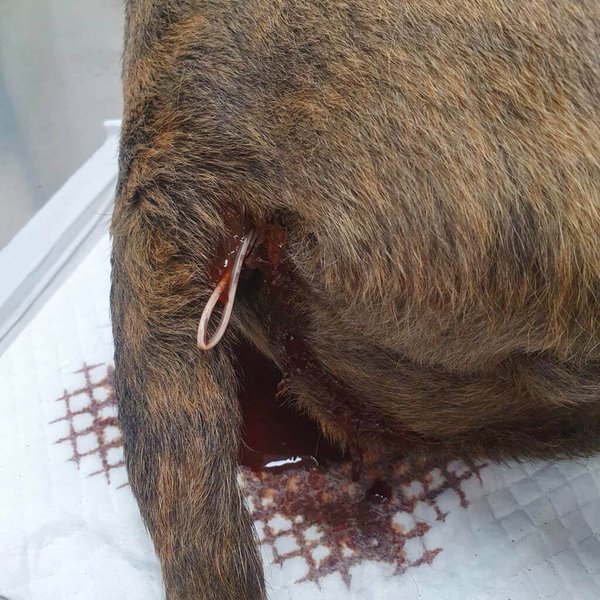
Roundworms typically attach themselves to the walls of your dog’s intestines and get nutrients from the partially digested food in your dog’s gut. However, it is possible for some roundworms to burrow their way through the intestines and infect other body organs and tissues.
Hookworms
Hookworms are short worms that attach to your dog’s intestines and feed off the dog’s blood. They have small teeth that they use to attach themselves to the intestines. Due to their feeding method – sucking blood from the intestines – hookworms can be very dangerous, especially in young puppies.
Whipworms
This type of worm is a lot less dangerous than the others discussed in this article. They live in the colon and do not generally cause problems to your dog unless they happen to burrow into intestinal tissue. It is very difficult to know that your dog is infected with whipworms because they don’t show any symptoms.
Tapeworms
Like hookworms, tapeworms have tiny teeth that they use to attach themselves to the walls of the small intestines, where they feed on digested food. They are flat (hence the name tapeworm) and can get very long, sometimes exceeding a foot in length.
Other intestinal parasites that affect dogs include intestinal flukes, coccidian, and giardia.
What Are The Symptoms Of Having A Parasite?
Symptoms
One of the biggest concerns for dog owners is how to tell if a dog has worms or parasites. If a dog has worms or parasites, it may exhibit the following symptoms:
- Vomiting
- Diarrhea
- Weight loss
- Abdominal pain or swollen abdomen
- Coat looks unhealthy
- Dehydration
- Lethargy
- Anemia
- Bloody stool
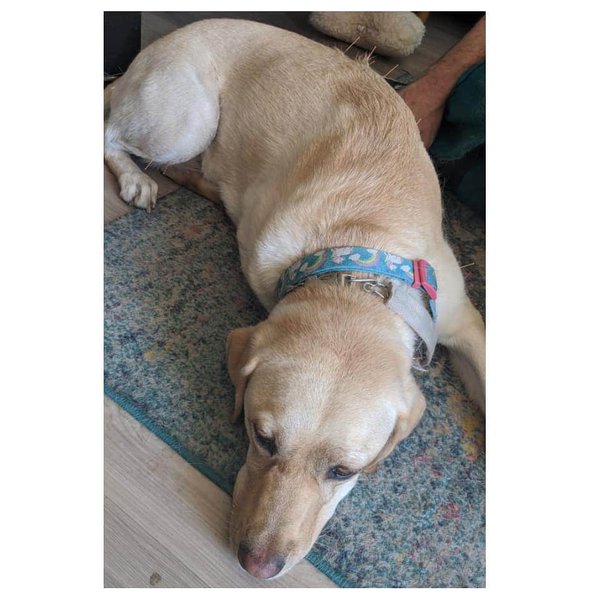
What Are White Worms In Dog’s Poop?
If you notice white worms in your dog’s stool, this is a sign that your dog is infected with tapeworms. The white worms you see are segments of the tapeworm which have broken off. These segments contain the tapeworm’s eggs.
If your dog has a tapeworm infection, you’ll also notice these white worms on your canine buddy’s rear end and around the area where your dog sleeps.
How Do Vets Test For Parasites?
Apart from a tapeworm infection, where you’ll notice white, rice-like worms in your dog’s poop, it is impossible to tell whether your dog has a worm infection from observation.
To confirm whether your four-legged buddy has a worm infection, veterinarians carry out a stool examination. This is a process where your dog’s stool is examined under a microscope to confirm whether there are any worm eggs in the stool.
Can Worms Affect A Dog’s Behavior?
Yes, it is possible for your dog’s behavior to be affected by worms. Some of the behavior changes you’ll notice if your pooch has a worm infection include laziness and increased appetite. This happens because your dog is not getting enough nutrients from the food they are eating.
How Did My Dog Get A Parasite?
How their beloved pooch got parasites is one of the most confounding things for pet owners. So, what causes intestinal parasites in dogs?
Here are the different ways through which your dog can get infected with intestinal parasites…
From The Mother
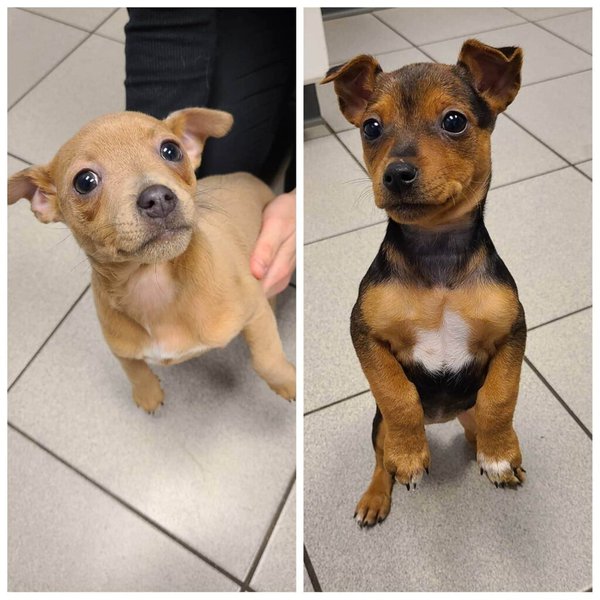
If a mother is infected with hookworms or roundworms, it is possible for these worms to burrow their way into the uterus and infect an unborn puppy. An infected mother can also pass these worms to her puppies through breastfeeding.
Ingesting Infected Fecal Matter
When a dog with worms poops, its poop will contain the eggs of these worms. This infected fecal matter can leave the soil contaminated even long after the fecal matter has decomposed. If your dog ingests this soil, it will get infected with the worms.
Dogs usually ingest contaminated soil accidentally when they are grooming themselves.
Contact With Contaminated Soil
It is possible for hookworms to penetrate into your dog through any part of the skin. This means that if your dog walks or lies on soil that is contaminated with hookworms, it can easily get infected.
Ingesting Infected Animals
If your pooch hunts and eats an animal that is infected with worms, or if you feed your dog with raw meat from an animal infected with worms, your dog will get infected as well. This is why it is not advisable to give your canine buddy raw meat.
So, how do you get rid of intestinal parasites after your dog gets infected?
How Do You Get Rid Of Intestinal Parasites In Dogs?
Home Remedies
It is possible to get rid of worms in a dog without going to the vet. Some home remedies you can give to your dog to get rid of worms include pumpkin seeds, coarsely chopped carrots, turmeric, dried coconut, and chamomile.
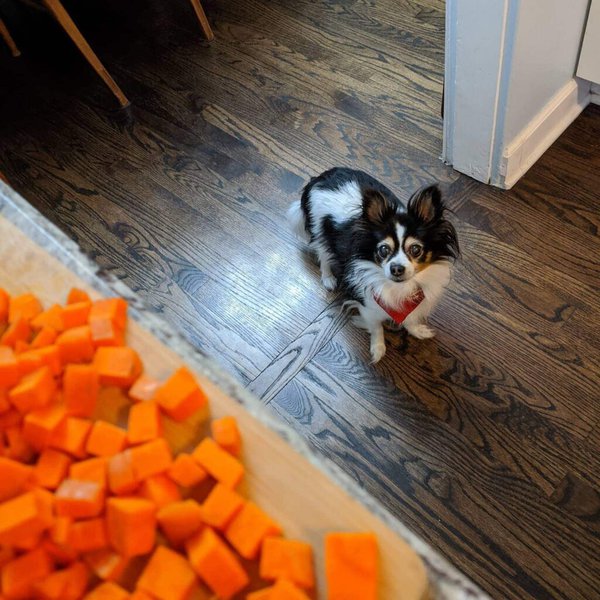
Does Apple Cider Vinegar Kill Worms In Dogs?
Apple cider vinegar is another effective home remedy for getting rid of intestinal parasites in dogs. This works by making the environment in your dog’s intestines more alkaline, making it impossible for worms to survive.
To use apple cider vinegar to get rid of worms in a dog, simply add about half a teaspoon of the vinegar to your dog’s drinking water.
Do Antibiotics Kill Parasites In Dogs?
Yes. Dogs infected with worms can be given antibiotics, which can be administered orally or by injection. The kind of antibiotic given will depend on the specific worms that have infected your dog, so a stool examination will need to be done first.
Do Probiotics Kill Parasites?
Recent studies have shown that probiotics can also be useful in getting rid of worms and other intestinal parasites in dogs. Probiotics work by introducing beneficial bacteria to your dog’s gut, thus helping to get rid of worms and parasites.
What Do Vets Use To Deworm Dogs?
Vets will usually prescribe dewormers after they have ascertained that your beloved pooch has a worm infestation. Most dewormers will need to be administered in multiple doses to effectively get rid of the infection.
How Do You Prevent Parasites In Dogs?
No dog parent wants their dog to get infected with worms, so you definitely want to know how you can prevent your dog from getting infected. Here are some ways to reduce the risk of your dear Fido getting worms.
Maintain Your Dog’s Hygiene
We see that dogs can get worms while they are grooming themselves, which is why you need to help your pooch maintain good hygiene. Always give your dear Fido a bath every time you think they could have gotten in contact with contaminated soil.
The best shampoo to use for this is Veterinary Formula Clinical Care Antiparasitic & Antiseborrheic Medicated Dog Shampoo. With its anti-parasitic ingredients, this shampoo will ensure that no parasites will be left lurking on your doggie’s coat.
Clean After Your Dog
Even after your dog has received treatment for worms, they can easily get infected again, so you need to properly clean after your dog. Thoroughly clean any dog poop from your yard, and clean the areas where your pooch spends a lot of time.
Dog worms can even live on carpet, so you’ll also need to thoroughly clean your carpets. I recommend using Bissell ProHeat 2X Revolution Max Clean Pet Pro Full-Size Carpet Cleaner for this. This cleaner uses heat from steam to kill worm eggs or larvae, ensuring no more will be left lurking on your carpets.
Get Regular Checkups
It’s also a good idea to have your dog undergo a stool examination every six months. This way, any worm infection will be discovered and treated early.
Related Questions
Do Worms Make Dogs Poop More? Yes, worms can cause diarrhea, which will cause your dog to poop more. If you notice that your dog is pooping more frequently than normal, and if their poop doesn’t look normal, you should take your canine buddy to a vet and have them undergo a stool exam to test for worms.
How Common Is It For Humans To Get Worms From Dogs? It is possible for humans to get worms from dogs, though it is not very common. You can get worms from your dog licking you. You can also get worms from your dog sleeping in your bed. This is why it is very important to keep your dog free of worms.
How Long Does It Take For Worms To Die After Treatment? It will take a few days to a few weeks for your dog to be totally free of worms after treatment. Even after treatment, you will notice worms in your dog’s poop. This is totally normal. Even if they are alive, the worms will die after your dog poops them out.

